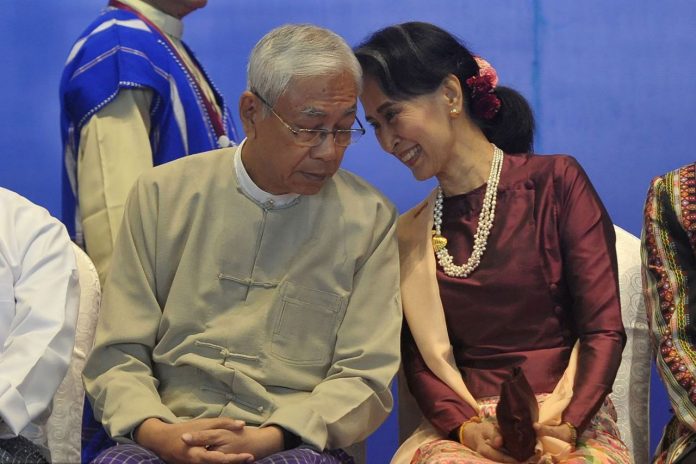The National Unity Government (NUG) of Myanmar, a civilian-led administration and alternative to the military regime in Naypyidaw, called the arrest warrants issued by a court in Buenos Aires, Argentina against jailed State Counsellor Aung San Suu Kyi and former President Htin Kyaw “a misguided and erroneous legal accusation” on Tuesday.
“[T]he inclusion of State Counsellor Daw Aung San Suu Kyi and former President U Htin Kyaw in the case filed at the Argentine court may create misunderstandings between the Rohingya community and other ethnic groups,” stated the NUG press release on Feb 18.
It requested the Argentine prosecutor, who issued the 25 warrants against Myanmar’s current and former civilian and military leaders to withdraw the two for Aung San Suu Kyi and Htin Kyaw, both members of the National League for Democracy (NLD) government from 2016-21. Htin Kyaw served as president from 2016-18.
Aung San Suu Kyi has been held incommunicado by the regime since it staged a coup on Feb. 1, 2021. Htin Kyaw’s current whereabouts are unknown.
The arrest warrants were issued Feb. 13 by the Argentine court for their alleged involvement in genocide against the Rohingya, along with 23 top military officials, including the regime leader Min Aung Hlaing and his deputy Soe Win.
“We like to suggest [that] Argentina appoint [its] needed and vacant judge positions firstly for their domestic judiciary if they want to criticize Myanmar according to the law,” Zaw Min Tun, the regime spokesperson, told regime media on Saturday.
The regime seemed to be referencing reports in December that Buenos Aires needed to name 150 judges across all levels of Argentina’s judiciary.
This Rohingya genocide case was initiated by the Burmese Rohingya Organisation UK (BROUK) under the legal principle of universal jurisdiction, which allows countries to prosecute people for serious crimes, regardless of where the crime occurred or the nationality of the perpetrator or victim.
“Our priority was to target especially the military, because after the 2021 coup until today, they are committing crimes. This is the military [that for] many decades committed genocide, war crimes, [and] crimes against humanity against Rohingya and all [other] minorities [in Myanmar],” Tun Khin, the BROUK president, told DVB.
The case was opened in 2021 and is based on a 2019 petition by BROUK that examines the role of Myanmar’s military leaders in genocide and crimes against humanity committed in a Rohingya village in Rathedaung Township of northern Arakan (Rakhine) State, on Aug. 27, 2017. Rathedaung is located 44 miles (70 km) north of the Arakan State capital Sittwe.
The initial press release from BROUK on Feb. 14 sparked criticism for not sharing the precise number of Myanmar’s current and former officials listed in the 25 arrest warrants.
It mentioned only the military leaders but was later updated to include the names of Aung San Suu Kyi and Htin Kyaw. This led to scrutiny from journalists and analysts covering Myanmar.
“BROUK is now saying that it actively opposed Suu Kyi’s inclusion in the arrest warrants, citing Myanmar’s changed political circumstances. What changed as far as her complicity is concerned? And why did they quietly update their statement instead of making their position explicit?” Shafiur Rahman, a journalist who writes the Rohingya Refugee News newsletter, wrote on Saturday.
The International Criminal Court (ICC) Chief Prosecutor Karim Khan requested an arrest warrant for Min Aung Hlaing in November for alleged crimes against humanity for the forced deportation of Rohingya to Bangladesh during the 2016-2017 military crackdown in northern Arakan.
A 2019 genocide case brought by The Gambia against Myanmar at the International Court of Justice (ICJ), the U.N. high court, is underway. The regime has not followed the ICJ provisional measures to prevent genocide against the Rohingya and preserve evidence as it has requested.



